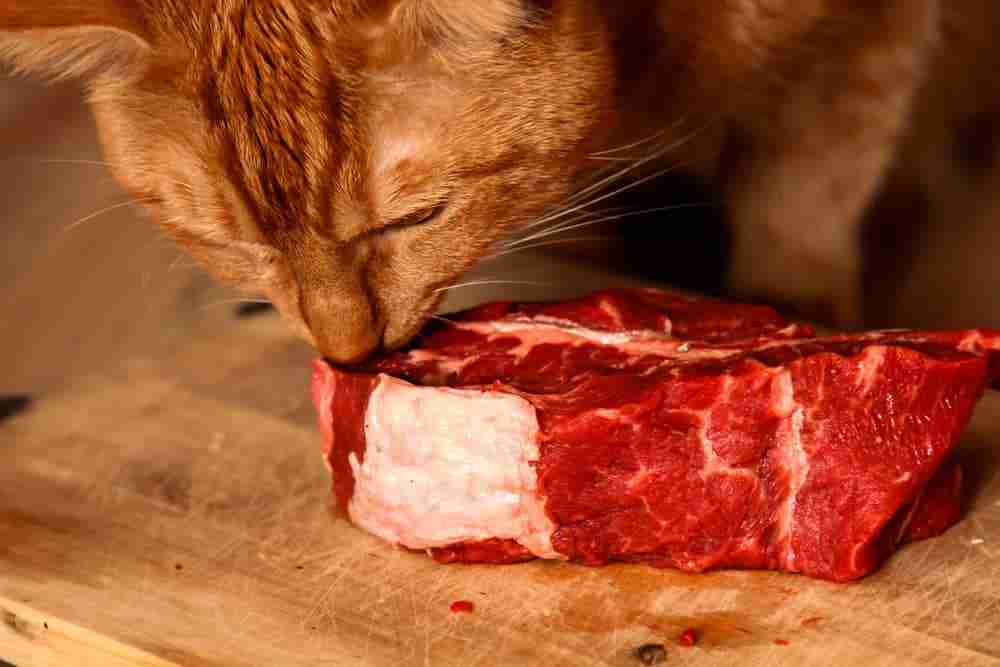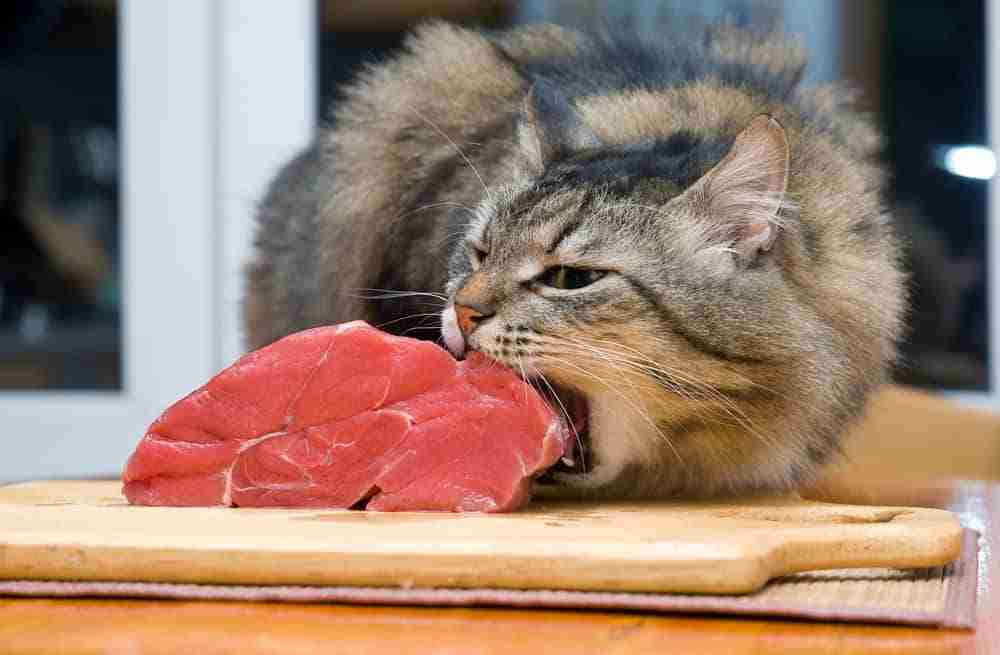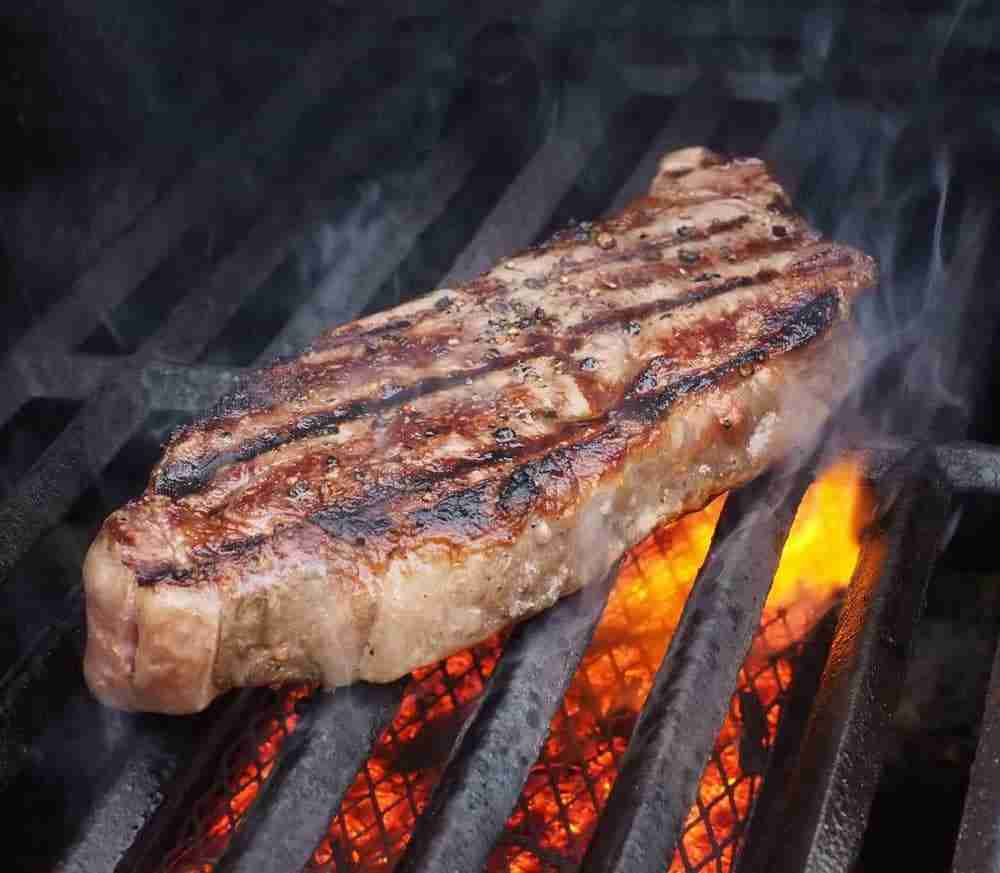Can cats eat beef? Can cats eat raw beef or ground beef? What about steak? Yes, they can. But, it is probably best to cook the beef to remove some fat from the meat and ensure there are no dangerous bacteria or pathogens on the meat. Read on to learn more…
How many times have you put food in your cat’s bowl only to have them turn up their nose at you, turn around, flick their tail, and walk away? We bet it’s more than a few times, right?
Cats are notoriously picky eaters, and they are quick to let you know when they think you are feeding them garbage – even if it’s the best premium food on the market.
However, you’re finishing frying some ground beef for enchiladas, and you find your cat figure-eighting between your legs. She’s gently mewing and hoping you’ll give her some of that tasty ground beef that smells so good.
So, should you give your kitty a taste of the beefy goodness, or should you chase her away? Can cats have beef? Is it okay to add it to their diet? This post gives you everything you need to know about feeding your cat beef.
Can Cats Eat Raw Beef?
Yes, your kitty can eat raw beef without any issues. Cats are “obligate carnivores,” meaning their digestive system evolved to process meat.
Cats lack the digestive enzymes necessary to break down carbohydrates, and they often encounter food aversions and problems with store-bought pet food formulations.
However, there’s a couple of problems with feeding your cat raw beef, and we recommend that you cook it before giving it to your kitty.

Should I Feed My Cat Raw Beef At Home?
Raw meat is fine for your kitty, but there could be a few unseen issues with feeding your cat a raw diet. First, cats’ digestive systems prefer a high protein diet but low in carbs and fats. Beef is a naturally fatty meat, and feeding your cat a fatty piece of meat could end up upsetting their stomach.
If you’re going to feed your cat raw beef, we recommend you look for beef that’s as lean as possible. Only feed your cat lean 90/10 ground beef, as the 70/30 or 80/20 varieties might cause digestive problems for your kitty.
The second issue involving feeding your cat a raw beef diet comes from the pathogens involved in the slaughtering and packaging process. While most meatpacking plants emphasize sanitation, hygiene, and safety, there’s always the chance that a virus or bacteria could end up on the raw food.
Your cat may contract an infection caused by the bacteria or virus when eating the tainted meat. Salmonella is a common foodborne bacteria that can cause your cat severe gastric distress.
Finally, feeding your cat a raw beef diet is a bad idea because it might change their personality. Feeding your cat a raw beef diet emulates what they would experience in the wild. Typically, feral cats survive on a diet of mice and birds they catch.
Feeding your cat a raw diet connects them with this innate hunting instinct, and you might start to see your cat develop aggressive behavior.
Cats Can Eat Steak?
Yes, like ground beef, cats can also enjoy some steak in their diet. However, like ground beef, we recommend that you feed it to them cooked.
What Are the Benefits of Feeding My Cat Beef?
As an obligate carnivore, meat is your cat’s natural diet. However, as mentioned, feeding them raw beef isn’t a good idea, and it’s better if you cook it for them before feeding. Beef is a nutritious meal for your cat, providing them with all the protein they need to meet their daily nutritional requirements.
However, it’s important for pet owners to note that feeding their cat beef should only be a treat from time to time. Feeding your cat a beef-only diet may cause your cat to develop food aversions, and they might not get all the nutrients they need from their food.
Steak or ground beef should only feature as a treat in your cat’s dinner bowl. Always ensure that you cook the meat before feeding to remove the risks outlined earlier. If you want to feed your cat a meat-only diet, consult with your veterinarian before changing your cat’s dinner plans.
Lean, cooked or dried beef has a place in your cat’s diet, just not every night. When you give your kitty beef in small amounts, they benefit from a bump in their nutrition. Beef contains many beneficial essential minerals and vitamins that assist your cat’s development.
Protein, iron, niacin, zinc, selenium, and Vitamin B12 are all present in beef in significant quantities that boost your cat’s health. B12 is an important vitamin for your cat, and we’ll get into that right now.

Why Do Cats Need Vitamin B12?
Vitamin B12, also known as “cobalamin,” is a critical nutrient for the health and development of your cat’s central nervous system (CNS). B12 helps to regulate the immune system, providing support to the digestive tract and metabolic function.
Cats don’t produce Vitamin B12 naturally. They get it from the food they eat. That’s why all vet-approved cat food formulations include significant quantities of B12. However, beef is a great source of Vitamin B12, making it the ideal treat for your kitty.
The average healthy feline can absorb B12 from their food and retain it in their body for around 12 to 13 days. Therefore, cats require constant exposure to this nutrient through their diet to maintain adequate levels in the body.
If cats don’t get enough B12 in their diet, they may become deficient in the vitamin. Some of the signs and symptoms cats display when they experience B122 deficiency include rapid weight loss, vomiting, diarrhea, and lethargy.
Some older cats may struggle to absorb Vitamin B12 from their food. As a result, they may require B12 supplementation in their diet or need exogenous B12 injections from the vet to maintain adequate levels of the vitamin.
How to Cook Beef for Cats
If you want to give your cat some beef in their diet, we recommend that you serve it to them cooked instead of raw. Never feed your kitty table scraps, and no food you prepare for your dogs. When preparing the meat, don’t add any seasonings, and cook it without any oil in the pan.
Make sure you buy the leanest beef you can find for your kitty. After you finish cooking it thoroughly, remove it from the pan and mop up any extra fat with a paper towel. Let the beef rest and drain away as much of the remaining fat as possible.
Pack the meat out into Tupperware containers, and keep it in the refrigerator for up to five days. If you’re feeding the cat the beef from the fridge, make sure you let it reach room temperature before serving.
Cats won’t eat cold food; it reminds them of a dead animal. While cats may kill and eat rodents, they don’t touch dead animals because they are predators, not scavengers.
Unless recommended by your vet, stick to feeding your cat a beef meal once or twice a week. The rest of their meals should come from a vet-approved kibble formulation or wet food recommended for your cat by your veterinarian.
Considerations for Feeding Your Cat Beef
So, to answer your question, there’s nothing wrong with feeding your cat a little beef from time to time. However, make sure you get lean cuts and mop up all the fat after cooking. Serve the beef to your cat as a treat, not a staple – unless recommended by your vet.
Never serve your cat seasoned meat. If you’re cooking ground beef for the family, clean the skillet before you start cooking for your cat, or cook their beef before frying yours.
Never feed your cat beef with bones, as it presents a choking hazard to your cat. It’s also important to note that the average cat’s daily nutritional requirements are around 300-calories. That’s not a lot of food.
A three-ounce serving of cooked beef can contain up to 178-calories. If you don’t pay attention to how much you’re feeding your cat, they can pack on weight fast. Frying the meat in oil also adds more fat to the meal and more calories.
Therefore, we recommend frying your beef in a coated non-stick pan using no oil. Make sure you’re using a non-stick pan with a PTFE-free coating. These Teflon coating can wear away, causing your family and your cat to ingest these harmful toxins.
Cook up some beef for your cat this evening and see how they react. Chances are they’ll love you for it.
